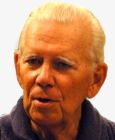
Happiness
Happiness With Life 10: Practice Curiosity
Learn something new everyday
Posted June 30, 2015

In thinking about what to write for this tenth blog in the series, “Happiness With Life,” I googled the word “curiosity” and found a treasure trove of fascinating information. Clicking on the website, “Curiosity Streams,” I came upon the following topics, all in video form: Love In Action, The Curious World Of Dreams, Quarx, William The Conqueror, The Age Of Robots, Life 2,000 Meters Under The Sea, Vikings, and Behind The Artist, among others.
Scrolling down further, I clicked on another website, “Curiosity: Be Inspired To Learn Every Day.” If Curiosity Streams tackled the big things, then “Be Inspired…” hit the bizarre and the obscure. It told me about the “Strange Things Owned By Henry VIII,” research showing that All Kangaroos Are Left-Handed, and Hair-Raising Facts About Shampoo.
What a discovery. Before I knew it, I became engrossed in reading about these fascinating topics and almost forgot about you, dear reader. Well, I'm back, and I have to say I enjoyed every minute of my trek through the world of curious concepts, facts, and fascinating tidbits.
Then it struck me that practicing curiosity can provide quite a number of benefits to our lives. Here are some I thought of. I wonder if you can add to the list.
• Curiosity educates us to facts and ideas we never would have acquired without it.
• Curiosity exercises our mind and can help keep us mentally alert.
• Curiosity can broaden our perspectives, both factually and philosophically.
• Curiosity can educate us to dangers in the world about which we were previously ignorant.
• Curiosity can expose opportunities to us that we might have otherwise overlooked or ignored.
• Curiosity can make us a more fascinating and enjoyable person, if we don't take our growing wealth of information to a know-it-all level.
• Curiosity can slow us down and help us smell the proverbial roses.
• Curiosity can help you develop new friendships and deepen existing ones, since everyone, I'm convinced, has fascinating and intriguing stories to tell.
• Curiosity can enrich our lives with fun, pleasure and wonder, given the vast numbers of ideas and things that populate our world.
• Because of all the above, and more, curiosity can greatly add to the happiness in our life.
Being Curious
I know of no research on curiosity, particularly as it relates to happiness, though I expect it exists somewhere. What I do suspect, though, is that each of us falls somewhere on the curiosity bell shaped curve, some very high and some very low, the majority of us somewhere in the middle.
What I do know is that each of us can act with curiosity each day of our lives and immediately start reaping the benefits listed above. Here are five exercises off the top of my head that we both can begin today. Choose one or two and begin it.
1. Register on one or both of the two websites I mentioned above and delve into one of the topics contained therein each day. Ted Talks would be another source, and I'm sure that there are many more.
2. Make a point to learn one thing interesting about at least one person you encounter each day. People are endlessly fascinating.
3. Purchase an online, DVD, or CD course. This is not an endorsement, but I work myself through a course produced by The Great Courses, a company that offers college-level courses taught by leading experts and master teachers on topics ranging from philosophy to science to history. They require only 30 minutes a day and provide an endless source of fascination and fun.
4. Read for re-creation, as well as for recreation. The world of literature is so vast there is something for everyone between the covers of books. I, for example, read nothing but memoirs, now that I am writing one of my own. What fascinates me is both the lives of the people about whom I read and the techniques the authors use to make their world interesting. What an education for a psychologist. What fun it is to spend fifteen to twenty minutes a night exploring the minds and lives of other people.
5. Just be open. In his memoir, A Lucky Life Interrupted (Random House, 2015), Tom Brokaw recounts his bout with cancer and what he learned from it. One of his pearls of wisdom is this: “The thing I love about New York is that I never fail to get up in the morning and think, ‘Something adventurous is going to happen today’… And if you want to be lucky you've got to go out and take advantage of it.” Sage advice you and I would be wise to follow. There are adventures for each of us each day, if we keep our eyes peeled and take the time to take a bite of them.
Going Forward
Like with every one of the other Happiness On Purpose strategies I've shared in this blog series, I feel compelled to emphasize that happiness won't come your way simply out of luck or because you're good person. You will have to act to make it happen. I have provided you five strategies to help you incorporate the trait of Curiosity into your happiness-producing arsenal. Do one or two of these today and each day going forward. It will work to your benefit just like it has for me.
I want you to know that you can contact me at anytime and I will respond. Till we chat again next month, live healthy, happy, and with passion.
Russell Grieger, Ph.D. is a licensed clinical psychologist in private practice in Charlottesville, Virginia. The author of several self-help books, all designed to empower people to create a life they love to live, he invites you to check out his new relationship happiness book, The Couples Therapy Companion; A Cognitive Behavior Workbook. You may contact Dr. Grieger for questions or for more information at grieger@cstone.net



